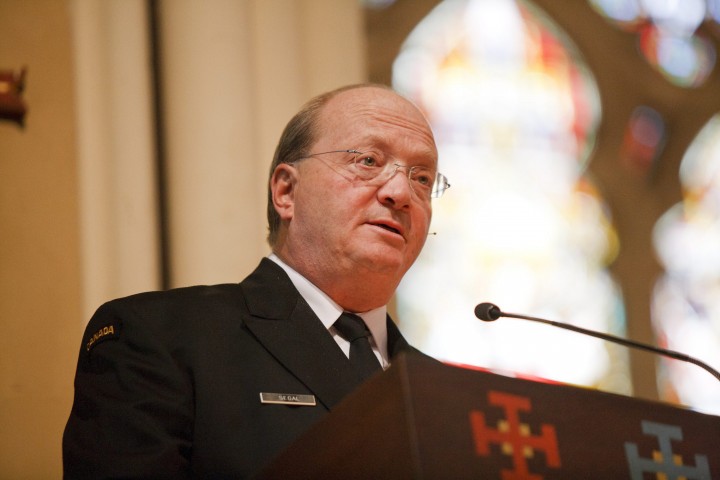OTTAWA – Conservative Sen. Hugh Segal says it’s “deeply problematic” that Canada lacks a full-fledged national security committee of parliamentarians to keep an eye on spy agencies.

At a national intelligence conference Wednesday, Segal described current oversight of the spy world as a “non-system of zero legislative accountability.”
It features parliamentary committees — including one on which Segal sits — that aren’t allowed to see secret documents and watchdogs that conduct after-the-fact reviews, the senator told a symposium of the Canadian Association for Security and Intelligence Studies.
READ MORE: Nerd farm no more: Speech offers rare glimpse into eavesdropping agency
He pointed to countries such as the United States and Britain where parliamentarians are able to tackle current crises head-on, eliciting candid testimony from spy chiefs.
In Canada, no one — least of all the responsible cabinet minister — steps forward to address the issues when an intelligence crisis erupts, Segal acknowledged.
“Any minister who says, ‘Actually, we have a big problem, I’m going to look into it’ these days is not part of the operative political culture,” he said.
“And I think that is deeply, deeply problematic.”
Segal said there has been a “lack of political will” to address the question with a measure of discretion, balance and focus.
READ MORE: CSEC chief defends surveillance activities
Segal’s comments follow highly publicized allegations about Communications Security Establishment Canada, the national eavesdropping agency known as CSEC.
Documents leaked by former U.S. intelligence contractor Edward Snowden suggest CSEC initiated a spy operation against Brazil’s ministry of mines and energy and helped allies monitor leaders at a G20 summit.
Last month, the NDP unsuccessfully sought support in the House of Commons to study stronger oversight for the intelligence community.
More recently, Liberal public safety critic Wayne Easter tabled a private member’s bill to create a national security committee of parliamentarians that would have access to top-secret information.
Segal said he hopes there’s a constructive discussion about Easter’s proposal, which effectively revives an idea broached by the former Liberal government of Paul Martin shortly before the Conservatives took power.
READ MORE: Are you in Canada’s cyberspy data banks? Maybe. But good luck getting that info
University of Toronto law professor Kent Roach told the symposium Wednesday that a national security committee of MPs and senators would not be a panacea for intelligence oversight.
Easter’s bill worries Roach because the government would have “unfettered and unreviewable discretion” to decide what information the parliamentary committee would see.
“So I’m not terribly optimistic about that,” said Roach, who served as part of the research advisory group on the O’Connor commission of inquiry that looked into the Maher Arar torture affair.
Justice Dennis O’Connor recommended changes to allow national security watchdogs to exchange information and conduct joint investigations. He also advocated a co-ordinating committee that would include various security watchdog chairs to ensure seamless handling of complaints and probes.
Roach noted both the watchdog that monitors CSEC and the one that keeps tabs on the Canadian Security Intelligence Service have spoken of difficulty in following the intelligence trail through government because each has authority to peek into just one agency.
It’s time to adopt the “one big committee” approach to spy oversight instead of the current roster of watchdogs working in isolation, Roach said.
“We can be creative with the diverse composition. It can include present or past parliamentarians, judges, experts, civil society — I think that’s totally open, but we need to have a debate about it.”
The Conservative government has said it is studying the notion of an inter-agency review system that would modernize the current approach, but no details have emerged.



Comments